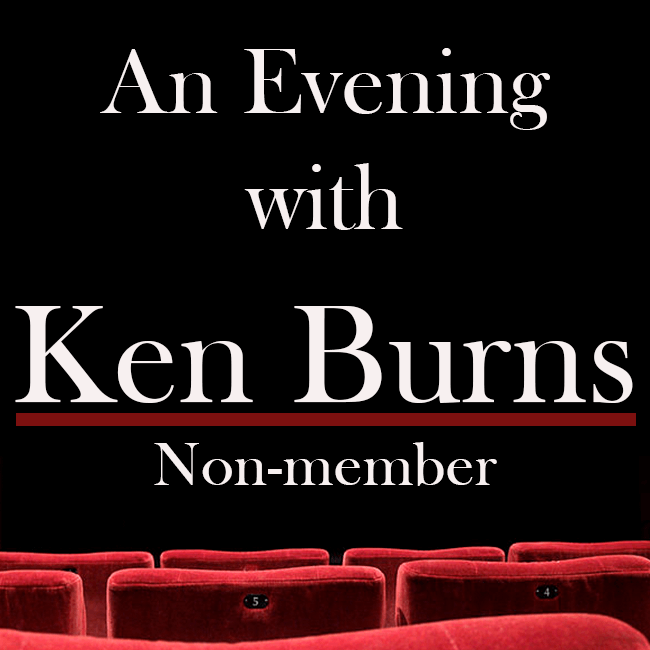
25 Aug Telluride Museum: Another No-Miss “Evening with Ken Burns,” 8/25/24!
The Telluride Historical Museum once again presents “An Evening with Ken Burns.” The program features the documentary “Huey Long.” Event takes place Sunday, August 25. Doors: 5:30 pm; screening, 6:00 pm, Michael D. Palm Theatre. The evening includes the screening, post-film Q&A, and book/DVD signing.
Tickets $20 for museum members; $25 for non-members; $5 for students. Tickets here.
Please scroll down to listen to TIO’s most recent podcast with Ken Burns.
And go here for more on Ken Burns in Telluride.
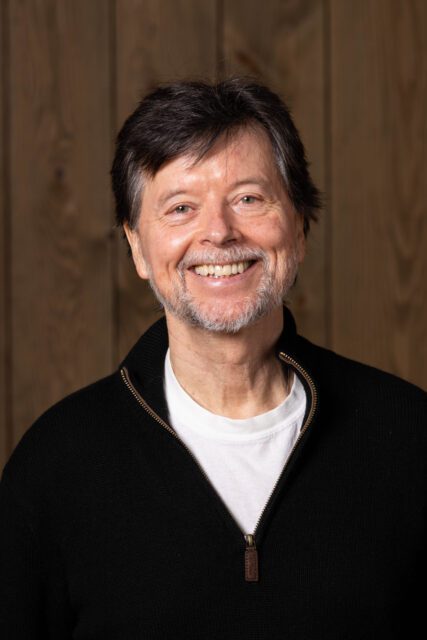
Ken Burns, Steve Holmes Photography.
All hail the unicorns of the world.
Three of the individuals who consistently color (or colored) outside the lines come together in what promises to be another very memorable evening with Ken Burns – one of the rarities under our magnifying glass.
“(Ken) Burns is not only the greatest documentarian of the day, but also the most influential filmmaker period. That includes feature filmmakers like George Lucas and Steven Spielberg. I say that because Burns not only turned millions of persons onto history with his films, he showed us a new way of looking at our collective past and ourselves,” raved The Baltimore Sun.
No doubt Burns is the most famous and most decorated documentary filmmaker in America, having made 35 films (and counting) films over the past five decades on subjects as varied as the Brooklyn Bridge, Civil War, Vietnam, Jefferson, Franklin, the Roosevelts, Mark Twain, Ali, baseball, buffalo, jazz, country music, etc.
“His work combines deep humanities research with a rich feeling for American life and culture and unparalleled public reach and appeal. Ken is one of the great public intellectuals and historians of our time, and he is also a terrific speaker,” summed up the National Endowment for the Humanities.
Huey Long encapsulated his claim to fame best when he told reporters “I am sui generis, one-of-a- kind. Just leave it at that.”
But history ignored Long’s suggestion, with Ken Burns ensuring the man’s legacy in his comprehensive portrait of the man, his politics and the power he jonesed for.
“Part of the series ‘Ken Burns’ America,’ this documentary covers the life of Huey Long, the infamous Louisiana senator who was assassinated in 1935. Viewed as a savior by the poor and a power-hungry Caesar by the rich, Long was an undeniably magnetic figure, running for office under the slogan “Every Man a King.” Interviewing everyone from farmers to writer Robert Penn Warren, whose novel ‘All the King’s Men’ was inspired by Long, Burns shows the man’s many sides, from genius to drunk,” said IMDb.
At the Telluride Historical Museum’s annual “An Evening with Ken Burns,” the screener will be “Huey Long,” first released in 1985.
The third of the aforementioned unicorns is arguably the greatest genius who ever lived: Leonardo da Vinci.
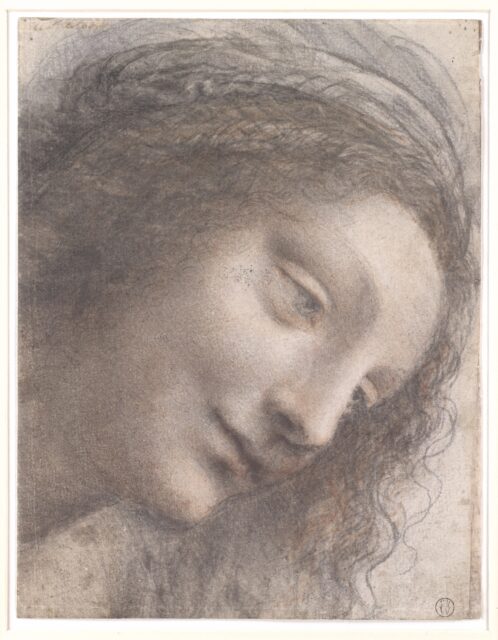
The Head of the Virgin in Three-Quarter View Facing Right. Circa 1510.
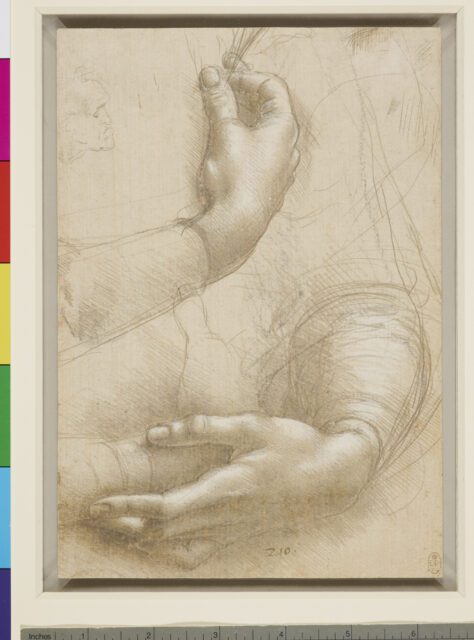
Image, courtesy Florentine Films.
“His designs and inventions were groundbreaking, he was without doubt the greatest genius ever, he sought to reshape the physical world…” wrote The Guardian.
UKEssays confirms:
“Leonardo da Vinci was born on April 15, 1452 in Anchiano, near Vinci in the Republic of Florence, which is now Italy. He died on May 2, 1519 in Cloux (now Clos-Luce) France. Leonardo da Vinci is believed to be the greatest genius that ever lived. Leonardo had become a master in more fields of any other before or since him. Most geniuses such as Albert Einstein or Alfred Hitchcock were masters only in a single field. It was not the case with Leonardo. He believed that all subject matter was interconnected in one way or another. Leonardo expressed a great deal of his other works in his works of art. He was an Italian painter, draftsman, sculpture, architect, engineer, mathematician, musician, scientist, a writer, and a well-known inventor.”
And the subject of Burn’s latest documentary, co-directed with daughter Sarah Burns and son-in-law David McMahon. Also his very first project to unfold entirely outside the continental United States.
The film marks a departure from Burns’ previous work in that it covers a non-American subject and it strays from the documentary style that made him famous, featuring split screens with images. Video and sound from different periods further contextualize Leonardo’s art and scientific explorations.
“Though we follow Leonardo’s personal journey and explore his artistic and scientific accomplishments, we’re also really focused on what went on in his mind and on understanding the depths of his curiosity,” explained McMahon. “Leonardo’s thinking was so unique, and in many ways timeless, that our traditional approach alone would have been insufficient.”
For more, check out TIO’s podcast with Ken Burns.
Ken Burns, more:
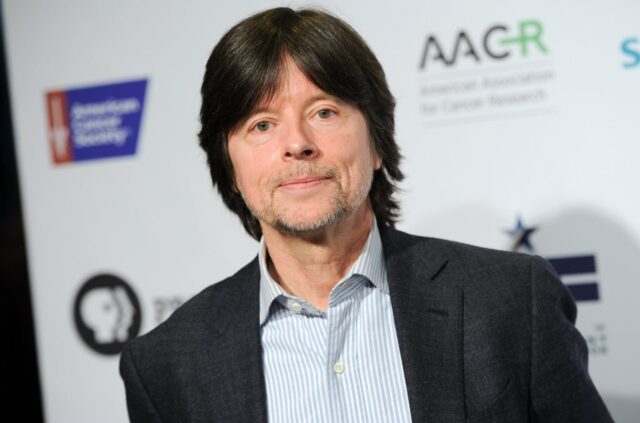
Ken Burns, courtesy Florentine Films.
Ken Burns is an award-winning documentary filmmaker known for his work on periods in American history and American culture. Often produced with WETA-TV and the National Endowment for the Humanities for broadcast on public television by PBS (Public Broadcasting Service), his films and television miniseries celebrate and examine the American experience with an unflinching eye. Only just now, with da Vinci, has Burns looked outside our country’s borders for a muse.
In Telluride, Burns is an honorary homie. The iconic filmmaker has a nearly 30-year relationship with our town, which he is known to describe shamelessly as “my lover.”
Since the Academy Award-nominated “Brooklyn Bridge,” Burns went on to direct and produce some of the most acclaimed historical documentaries ever made, recounting the histories of jazz, the Civil War, baseball, Prohibition, the decade-long calamity known as The Dust Bowl, the Roosevelts, the Vietnam War and the history of country music.
Burns has a well-deserved global reputation for in-depth meditations on Americana, projects on which he often wears many hats: writer, cinematographer, editor, and music director – in addition to producing and directing.
Many of his celebrated documentaries premiered at the Telluride Film Festival, which Burns has described as “the best festival on the planet” and where he now serves on the board. Examples include ”Huey Long,” 1985; “The Civil War,” 1990; “Baseball:The Tenth Inning,” 1994; “Frank Lloyd Wright,” 1998; “Jazz,” 2001; “Horatio’s Drive: America’s First Road Trip,” 2003; “The War,” 2007; “The Central Park Five,” 2013.
Two of Burns’ films screened at Telluride’s other major film-centric event, Mountainfilm, which debuted “The National Parks: America’s Best Idea,” 2009, and “The Dust Bowl,” 2013.
In the works are “LBJ and the Great Society,” “American Revolution, and “Reconstruction.”
“Leonardo da Vinci” screens on PBS in November.
Wynton Marsalis once described Ken Burns as follows: “…a master of timing, and of knowing the sweet spot of a story, of how to ask questions to get to the basic human feeling and to draw out the true spirit of a given subject.”
Burns’s films have won 14 Emmys and three Peabody Awards.
In 2008, the filmmaker received a Lifetime Achievement Award from the Academy of Television Arts & Sciences.


Sorry, the comment form is closed at this time.